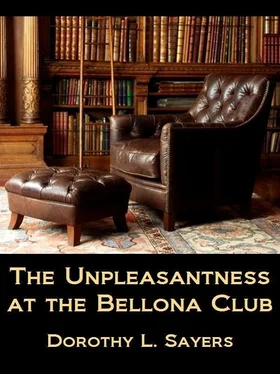“Does it matter? I mean, one doesn’t have to bother so much about husband-hunting today.”
“Oh, no! Husbands don’t matter at all, I suppose, to you advanced women. Any man will do, as long as he’s got money—”
“Why do you say ‘you’ advanced women? I didn’t say I felt that way about it. I don’t want to go out to work—”
“There you go. Taking everything to yourself. I know you don’t want to work. I know it’s only because of the damned rotten position I’m in. You needn’t keep on about it. I know I’m a failure. Thank your stars, Wimsey, that when you marry you’ll be able to support your wife.”
“George, you’ve no business to speak like that. I didn’t mean that at all. You said—”
“I know what I said, but you took it all the wrong way. You always do. It’s no good arguing with a woman. No — that’s enough. For God’s sake don’t start all over again. I want a drink. Wimsey, you’ll have a drink. Sheila, tell that girl of Mrs. Munns’s to go round for half a bottle of Johnny Walker.”
“Couldn’t you get it yourself, dear? Mrs. Munns doesn’t like us sending her girl. She was frightfully disagreeable last time.”
“How can I go? I’ve taken my boots off. You do make such a fuss about nothing. What does it matter if old Mother Munns does kick up a shindy? She can’t eat you.”
“No,” put in Wimsey. “But think of the corrupting influence of the jug-and-bottle department on Mrs. Munns’s girl. I approve of Mrs. Munns. She has a motherly heart. I myself will be the St. George to rescue Mrs. Munns’s girl from the Blue Dragon. Nothing shall stop me. No, don’t bother to show me the way. I have a peculiar instinct about pubs. I can find one blindfold in a pea-souper with both hands tied behind me.”
Mrs. Fentiman followed him to the front door.
“You mustn’t mind what George says to-night. His tummy is feeling rotten and it makes him irritable. And it has been so worrying about this wretched money business.”
“That’s all right,” said Wimsey. “I know exactly. You should see me when my tummy’s upset. Took a young woman out the other night — lobster mayonnaise, meringues and sweet champagne — her choice — oh, lord!”
He made an eloquent grimace and departed in the direction of the public house.
When he returned, George Fentiman was standing on the doorstep.
“I say, Wimsey — I do apologise for being so bloody rude. It’s my filthy temper. Rotten bad form. Sheila’s gone up to bed in tears, poor kid. All my fault. If you knew how this damnable situation gets on my nerves — though I know there’s no excuse…”
“’S quite all right,” said Wimsey. “Cheer up. It’ll all come out in the wash.”
“My wife—” began George again.
“She’s damned fine, old man. But what it is, you both want a holiday.”
“We do, badly. Well, never say die. I’ll see Murbles, as you suggest, Wimsey.”
Bunter received his master that evening with a prim smirk of satisfaction.
“Had a good day, Bunter?”
“Very gratifying indeed, I thank your lordship. The prints on the walking-stick are indubitably identical with those on the sheet of paper you gave me.”
“They are, are they? That’s something. I’ll look at ’em to-morrow, Bunter — I’ve had a tiring evening.”
Chapter VIII
Lord Peter Leads through Strength
At eleven o’clock the next morning, Lord Peter Wimsey, unobtrusively attired in a navy-blue suit and dark grey tie, suitable for a house of mourning, presented himself at the late Lady Dormer’s house in Portman Square.
“Is Miss Dorland at home?”
“I will inquire, sir.”
“Kindly give her my card and ask if she can spare me a few moments.”
“Certainly, my lord. Will your lordship be good enough to take a seat?”
The man departed, leaving his lordship to cool his heels in a tall, forbidding room, with long crimson curtains, a dark red carpet and mahogany furniture of repellent appearance. After an interval of nearly fifteen minutes, he reappeared, bearing a note upon a salver.
It was briefly worded:
“Miss Dorland presents her compliments to Lord Peter Wimsey, and regrets that she is not able to grant him an interview. If, as she supposes, Lord Peter has come to see her as the representative of Major and Captain Fentiman, Miss Dorland requests that he will address himself to Mr. Pritchard, solicitor, of Lincoln’s Inn, who is dealing, on her behalf, with all matters connected with the will of the late Lady Dormer.”
“Dear me,” said Wimsey to himself, “this looks almost like a snub. Very good for me, no doubt. Now I wonder—” He read the note again. “Murbles must have been rather talkative. I suppose he told Pritchard he was putting me on to it. Very indiscreet of Murbles and not like him.”
The servant still stood mutely by, with an air of almost violently disassociating himself from all commentary.
“Thank you,” said Wimsey. “Would you be good enough to say to Miss Dorland that I am greatly obliged to her for this information.”
“Very good, my lord.”
“And perhaps you would kindly call me a taxi.”
“Certainly, my lord.”
Wimsey entered the taxi with all the dignity he could summon, and was taken to Lincoln’s Inn.
Mr. Pritchard was nearly as remote and snubbing in his manner as Miss Dorland. He kept Lord Peter waiting for twenty minutes and received him glacially, in the presence of a beady-eyed clerk.
“Oh, good morning,” said Wimsey, affably. “Excuse my callin’ on you like this. More regular to do it through Murbles, I s’pose — nice old boy, Murbles, isn’t he? But I always believe in goin’ as direct to the point as may be. Saves time, what?”
Mr. Pritchard bowed his head and asked how he might have the pleasure of serving his lordship.
“Well, it’s about this Fentiman business. Survivorship and all that. Nearly said survival. Appropriate, what? You might call the old General a survival, eh?”
Mr. Pritchard waited without moving.
“I take it Murbles told you I was lookin’ into the business, what? Tryin’ to check up on the timetable and all that?”
Mr. Pritchard said neither yea nor nay but placed his fingers together and sat patiently.
“It’s a bit of a problem, you know. Mind if I smoke? Have one yourself?”
“I am obliged to you, I never smoke in business hours.”
“Very proper. Much more impressive. Puts the wind up the clients, what? Well, now, I just thought I’d let you know that it’s likely to be a close-ish thing. Very difficult to tell to a minute or so, don’t you know. May turn out one way — may turn out the other — may turn completely bafflin’ and all that. You get me?”
“Indeed?”
“Oh, yes, absolutely. P’raps you’d like to hear how far I’ve got.” And Wimsey recounted the history of his researches at the Bellona, in so far as the evidence of the commissionaires and the hall-porter were concerned. He said nothing of his interview with Penberthy, nor of the odd circumstances connected with the unknown Oliver, confining himself to stressing the narrowness of the time-limits between which the General must be presumed to have arrived at the Club. Mr. Pritchard listened without comment. Then he said:
“And what, precisely, have you come to suggest?”
“Well, what I mean to say is, don’t you know, wouldn’t it be rather a good thing if the parties could be got to come to terms? Give and take, you see — split the doings and share the proceeds? After all, half a million’s a goodish bit of money — quite enough for three people to live on in a quiet way, don’t you think? And it would save an awful lot of trouble and — ahem — lawyers’ fees and things.”
Читать дальше












